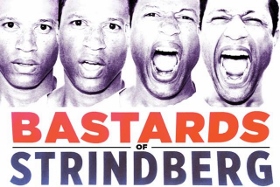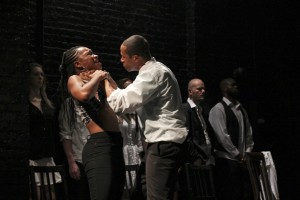MISS JULIE’S OFFSPRING
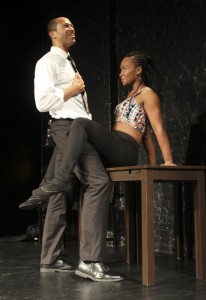 In 2012 the Scandinavian American Theater Company commissioned four playwrights to each write a sort of riff on Strindberg’s Miss Julie. The result is the four short plays that make up Bastards of Strindberg, a show so full of vitality and charisma that it often overcomes its failings.
In 2012 the Scandinavian American Theater Company commissioned four playwrights to each write a sort of riff on Strindberg’s Miss Julie. The result is the four short plays that make up Bastards of Strindberg, a show so full of vitality and charisma that it often overcomes its failings.
Strindberg’s Miss Julie begins on a magical Midsummer’s Eve, when Julie, the young daughter of a Swedish Count, makes the mistake of partying with her father’s servants and of having sex with one of them. In the end, the servant, Jean, convinces Julie that her only way out of her predicament is suicide.
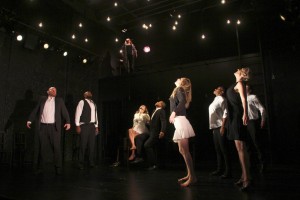 Anette Norgaard’s moving music and vocals, and Yuki Nakase’s fairy-light lighting design, work well to evoke the enchanted feeling of the white night, serving to complement David Bar Katz’s Chanting Hymns to Fruitless Moons, directed by Alicia Dhyana House, which is the first take on Strindberg’s classic tale. The most intriguing one of the four, this short play boasts tight and revelatory writing and an explosive climax, creating a world both mystical and mysterious. Unfortunately, the acting needs work. As so often happens when young performers play characters whose experiences are foreign to them, the two leads, Vanessa Johansson as Young Julie and Devin B. Tillman as John, don’t feel believable. Lacking sufficient foundation they play the surface, which results in hollow portrayals.
Anette Norgaard’s moving music and vocals, and Yuki Nakase’s fairy-light lighting design, work well to evoke the enchanted feeling of the white night, serving to complement David Bar Katz’s Chanting Hymns to Fruitless Moons, directed by Alicia Dhyana House, which is the first take on Strindberg’s classic tale. The most intriguing one of the four, this short play boasts tight and revelatory writing and an explosive climax, creating a world both mystical and mysterious. Unfortunately, the acting needs work. As so often happens when young performers play characters whose experiences are foreign to them, the two leads, Vanessa Johansson as Young Julie and Devin B. Tillman as John, don’t feel believable. Lacking sufficient foundation they play the surface, which results in hollow portrayals.
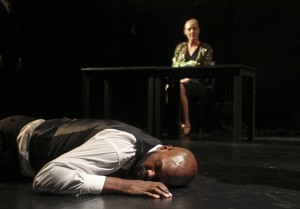 Lina Ekdahl’s whimsical and self-referential Midsummer at Tyrolen takes place in a coffee shop and features the delightful Rikke Lylloff as Julie, the insomniac daughter of the shop’s wealthy owner. Whether out of boredom or from lack of ideas, Julie takes a liking to Jean (an entertaining Albert Bendix), a local truck-driving slob who is engaged to the coffee shop waitress, Kristen (Ingrid Kullberg-Bendz). Under Henning Hegland’s capable direction, Midsummer is entertaining from beginning to end. I only wish the story was a bit less fuzzy and that the finale had a little more pop.
Lina Ekdahl’s whimsical and self-referential Midsummer at Tyrolen takes place in a coffee shop and features the delightful Rikke Lylloff as Julie, the insomniac daughter of the shop’s wealthy owner. Whether out of boredom or from lack of ideas, Julie takes a liking to Jean (an entertaining Albert Bendix), a local truck-driving slob who is engaged to the coffee shop waitress, Kristen (Ingrid Kullberg-Bendz). Under Henning Hegland’s capable direction, Midsummer is entertaining from beginning to end. I only wish the story was a bit less fuzzy and that the finale had a little more pop.
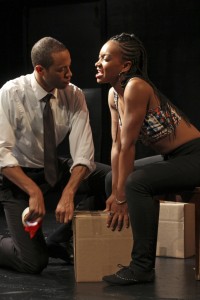 Dominique Morisseau’s High Powered, also directed by Mr. Hegland, centers on Mya (a solid Zenzele Cooper) and Darrin (Mr. Tillman filling in for Kwasi Osei; Tillman doing a much better job in this play than in the first one of the night). Until very recently, this black couple worked for the daughter of a financial tycoon’”she as a dog walker and he a limo driver. But now the tycoon’s daughter got her father to hire Darrin into his firm’s sales department. Darrin insists that this is due to his incredible mathematical abilities, but his wife suspects otherwise. What I like most about High Powered is Ms. Morisseau’s exploration of this poor, uneducated but ambitious black man’s mentality. He doesn’t just want to be rich, he wants to be upper class; he wants to be white. Ms. Morisseau also, on several occasions, takes the opportunity to speak about the differences between the 1% and the 99%. Most of this works, and a couple of her ideas are intriguing. But at some point she gets carried away, and one gets the sense that it is the author’s words coming out of Mya’s mouth, and not Mya’s.
Dominique Morisseau’s High Powered, also directed by Mr. Hegland, centers on Mya (a solid Zenzele Cooper) and Darrin (Mr. Tillman filling in for Kwasi Osei; Tillman doing a much better job in this play than in the first one of the night). Until very recently, this black couple worked for the daughter of a financial tycoon’”she as a dog walker and he a limo driver. But now the tycoon’s daughter got her father to hire Darrin into his firm’s sales department. Darrin insists that this is due to his incredible mathematical abilities, but his wife suspects otherwise. What I like most about High Powered is Ms. Morisseau’s exploration of this poor, uneducated but ambitious black man’s mentality. He doesn’t just want to be rich, he wants to be upper class; he wants to be white. Ms. Morisseau also, on several occasions, takes the opportunity to speak about the differences between the 1% and the 99%. Most of this works, and a couple of her ideas are intriguing. But at some point she gets carried away, and one gets the sense that it is the author’s words coming out of Mya’s mouth, and not Mya’s.
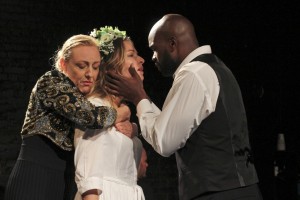 Andreas Boonstra’s self-conscious Truth about Fröken Julie, directed by Ms. House, starts off enjoyably enough. Jean (Drew O’Kane) serenades Julie (Ms. Johansson) with a song he says he wrote for her, but when he’s done Julie points out that it was not he but Bob Dylan who in fact wrote that song. But I could have written it, argues Jean. But you didn’t, retorts Julie. Then she, and later Kristin (Ms. Lylloff), take turns poking holes in every romantic story Jean tells; they even take apart his name’”what Swedish peasant would call his son Jean?
Andreas Boonstra’s self-conscious Truth about Fröken Julie, directed by Ms. House, starts off enjoyably enough. Jean (Drew O’Kane) serenades Julie (Ms. Johansson) with a song he says he wrote for her, but when he’s done Julie points out that it was not he but Bob Dylan who in fact wrote that song. But I could have written it, argues Jean. But you didn’t, retorts Julie. Then she, and later Kristin (Ms. Lylloff), take turns poking holes in every romantic story Jean tells; they even take apart his name’”what Swedish peasant would call his son Jean?
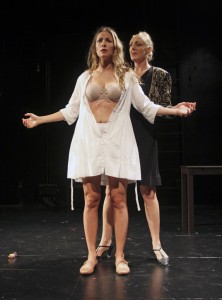 It’s a play commenting on itself and this is done with enough cleverness and charm to be amusing. But then Mr. O’Kane, or Jean, I’m not sure which, addresses the audience directly, arguing in effect that none of this is real, that it’s all lies, that it’s all theater, so why bother pretending? Mr. Boonstra then has Mr. O’Kane say something to the effect that although Strindberg’s naturalistic, realistic theater was innovative when he was creating it in the 1880s, today it’s 2014 and all that stuff is old hat and should be dispensed with. Mr. Boonstra is Swedish and an award-winning artistic director of an acclaimed independent theater in that country, so perhaps what he meant somehow got lost in the translation or interpretation, and does not sound as arrogant or idiotic in his mother tongue. There are all kinds of theater in the world, and to my way of thinking, before you start talking about discarding Strindberg, at least get your basics to where they are solid and unassailable; flimsy examples of innovation make a poor case for innovation. Maybe you could have written Miss Julie, but you didn’t.
It’s a play commenting on itself and this is done with enough cleverness and charm to be amusing. But then Mr. O’Kane, or Jean, I’m not sure which, addresses the audience directly, arguing in effect that none of this is real, that it’s all lies, that it’s all theater, so why bother pretending? Mr. Boonstra then has Mr. O’Kane say something to the effect that although Strindberg’s naturalistic, realistic theater was innovative when he was creating it in the 1880s, today it’s 2014 and all that stuff is old hat and should be dispensed with. Mr. Boonstra is Swedish and an award-winning artistic director of an acclaimed independent theater in that country, so perhaps what he meant somehow got lost in the translation or interpretation, and does not sound as arrogant or idiotic in his mother tongue. There are all kinds of theater in the world, and to my way of thinking, before you start talking about discarding Strindberg, at least get your basics to where they are solid and unassailable; flimsy examples of innovation make a poor case for innovation. Maybe you could have written Miss Julie, but you didn’t.
photos by Kait Ebinger
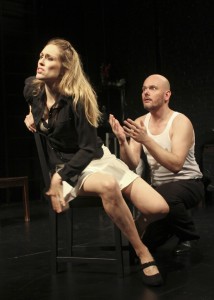 Bastards of Strindberg
Bastards of Strindberg
Scandinavian American Theater Company
The Lion Theatre at Theatre Row
410 West 42nd Street at 9th Avenue
Tues at 7; Wed, Thurs & Fri at 8;
Sat at 2 & 8; Sun at 3
ends on September 21, 2014
for tickets, call 212-239-6200
or visit Telecharge
